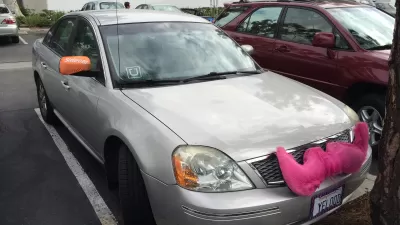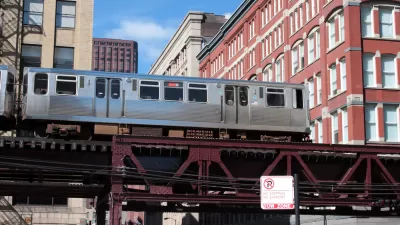Thanks to technology-enabled ride-hailing services, more households have the ability to go car-lite now than in preceding generations, according to a new study prepared for the American Public Transportation Association.
"At a press conference announcing a new study about mobility in American cities on March 15, Lyft’s director of transportation described her company and competitor Uber as 'allies'," writes Katy Steinmetz, chief of Time Magazine's San Francisco Bureau. What was more remarkable that the two competitors calling themselves allies, though, was that 39-page study [PDF] was prepared not for the ride-hailing industry but for the American Public Transit Association (APTA).
"Using Uber and Lyft is a gateway to a car-lite lifestyle, with users owning fewer cars in a household, according to the study," according to APTA's press release.
Now, I was unaware that "car-lite" (not "car-light") is a well-established term in transportation terminology. "We can make better cities by increasing the size and number of neighborhoods in which it's possible for the average person to live partially—not completely—car free," writes Daniel Herriges of Strong Towns. "There's a lot of value in living a car-lite lifestyle, and that's something available right now to many times more Americans than can currently, realistically, go car-free."
APTA "analyzed the usage of personal cars, public transit and other 'shared modes'—such as bikesharing, carsharing and the use of ride apps such as Uber and Lyft—in seven major cities: Austin, Boston, Chicago, Los Angeles, San Francisco, Seattle and Washington, D.C., " writes Steinmetz.
"This study was conducted by the Shared-Use Mobility Center (SUMC), with funding provided through the Transit Cooperative Research Program (TCRP). The study "suggests public transit and ridesourcing services such as Uber and Lyft are largely complementary, with each serving different trip types but working together to enhance urban mobility and decrease reliance on private autos," notes SUMC's press release
About SUMC: "The Shared-Use Mobility Center (SUMC) is a public-interest organization working to foster collaboration in shared mobility (including bikesharing, carsharing, ridesharing and more) and help connect the growing industry with transit agencies, cities and communities across the nation...."
FULL STORY: Time: Lyft and Uber Are ‘Allies’ in the Transit Revolution

Alabama: Trump Terminates Settlements for Black Communities Harmed By Raw Sewage
Trump deemed the landmark civil rights agreement “illegal DEI and environmental justice policy.”

Study: Maui’s Plan to Convert Vacation Rentals to Long-Term Housing Could Cause Nearly $1 Billion Economic Loss
The plan would reduce visitor accommodation by 25% resulting in 1,900 jobs lost.

Planetizen Federal Action Tracker
A weekly monitor of how Trump’s orders and actions are impacting planners and planning in America.

Wind Energy on the Rise Despite Federal Policy Reversal
The Trump administration is revoking federal support for renewable energy, but demand for new projects continues unabated.

Passengers Flock to Caltrain After Electrification
The new electric trains are running faster and more reliably, leading to strong ridership growth on the Bay Area rail system.

Texas Churches Rally Behind ‘Yes in God’s Back Yard’ Legislation
Religious leaders want the state to reduce zoning regulations to streamline leasing church-owned land to housing developers.
Urban Design for Planners 1: Software Tools
This six-course series explores essential urban design concepts using open source software and equips planners with the tools they need to participate fully in the urban design process.
Planning for Universal Design
Learn the tools for implementing Universal Design in planning regulations.
Caltrans
Smith Gee Studio
Institute for Housing and Urban Development Studies (IHS)
City of Grandview
Harvard GSD Executive Education
Toledo-Lucas County Plan Commissions
Salt Lake City
NYU Wagner Graduate School of Public Service





























